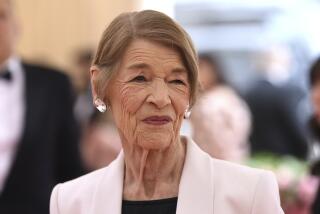Gordon Jackson, 66; Actor Who Reached Stardom as ‘Upstairs, Downstairs’ Butler
- Share via
Gordon Jackson, the butler who was the unquestioned master of the downstairs in the Emmy award-winning “Upstairs, Downstairs” TV series and whose lyrical Scots burr was heard in dozens of films, stage and other television roles, has died, his agent said Monday. He was 66.
Jackson died Sunday in London’s Cromwell Hospital with his wife, Rona, at his side, Michael Anderson said. The cause of death was not disclosed, but Anderson told wire service reporters that his client had recently been ill.
During his lengthy career, Jackson appeared in such films as “Mutiny on the Bounty,” “Tunes of Glory,” “Those Magnificent Men in Their Flying Machines,” “The Ipcress File” and “The Prime of Miss Jean Brodie.” He also acted with many of Britain’s most celebrated stage companies, including the Young Vic and the Royal Shakespeare Company.
Jackson never considered himself a star. “I’m just a well-known face,” he said. But he approached if not achieved a certain stardom in the international “Upstairs, Downstairs,” where his characterization won him a Royal Television Society award.
He also won a British Actor of the Year award in 1974 for the 1970-75 series, reruns of which are still being shown in the United States. He was awarded a supporting actor Emmy for his work in a 1975 segment of “Upstairs” entitled “The Beastly Hun.” And he was chosen for an Australian award for his performance in a TV dramatization of “A Town Like Alice,” a series based on a group of women and children forced to march through Malaya by the Japanese during World War II.
The tall, red-haired Jackson started acting as a teen-ager soon after the outbreak of World War II. His downcast, gloomy presence initially brought him roles as cowards and weaklings, but his talent broadened as he aged and with it came more sympathetic roles.
His acting career spanned nearly half a century and included more than 60 film credits, but he will forever be recalled as Hudson, whose staid, traditional sense of duty among the servants “downstairs” proved an underpinning to the aristocratic Bellamy family “upstairs” during the societal upheavals of World War I-era England.
Jackson, described as gentle and self-effacing by friends, once said: “My trouble is that I’m under-confident, and I’m too tentative. I’m not a go-getter and I never have been.”
Gordon Cameron Jackson was born in Glasgow in 1923. He made his first stage appearance in a singing competition, which he won. He was also a professional pianist and trained as a draftsman but got into acting by sneaking away from his job for an engineer whenever he could and applying for small parts at the BBC studios in his home city.
His break did not take long in arriving. Ealing Studios, one of the most famous in the World War II years, wanted a young man with an accent for a film role in 1941, and the BBC recommended him.
His first professional acting job came that year when he portrayed a Scottish soldier in the film “The Foreman Went to France,” a story of Britons trapped in France in 1940 by the German invasion.
He also played the undercover police chief Cowley in the British TV series “The Professionals” from 1977 to 1981, and was in the 1988 TV movie “Noble House.”
On stage, he was Shakespeare’s Banquo in “Macbeth,” Horatio in “Hamlet,” Mavolio in “Twelfth Night” and a host of other characters in London’s West End theaters.
“Upstairs, Downstairs” co-star John Alderton recalled Jackson as “the sweetest, gentlest man I have ever met. To have worked with him was a privilege, to be counted as a friend was an honor. His unparalleled contribution to film and television for over 50 years will remain a testament to his very special talent,” Alderton told the Associated Press.
But by the time the series went off the air, Jackson had had his fill of portraying domestic help or subordinate roles.
Following the success of “Upstairs, Downstairs,” he turned down a proposed series based on P. G. Wodehouse’s upper-class characters in which he would have portrayed the valet Jeeves.
“In 35 years of films,” he said, “I always seemed to be playing soldiers. Never officers. Always in the ranks.”
More to Read
The complete guide to home viewing
Get Screen Gab for everything about the TV shows and streaming movies everyone’s talking about.
You may occasionally receive promotional content from the Los Angeles Times.






